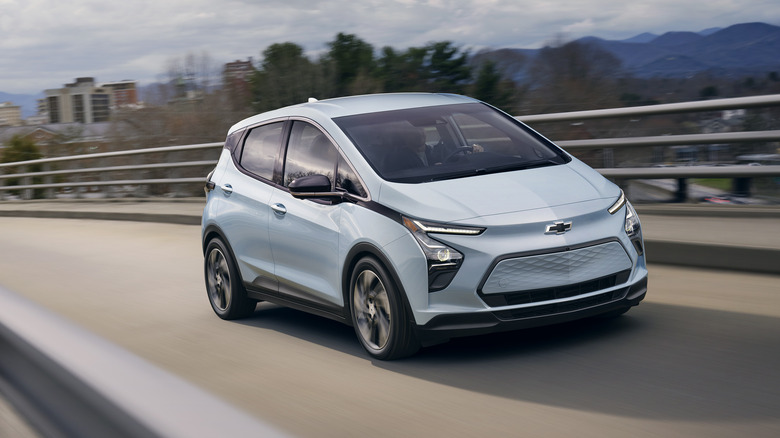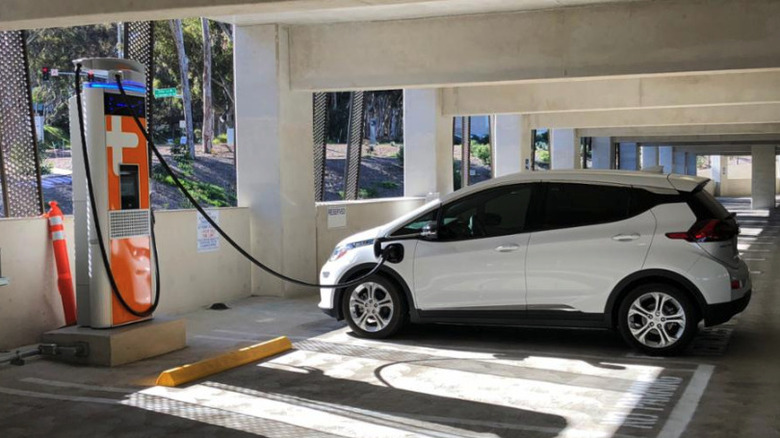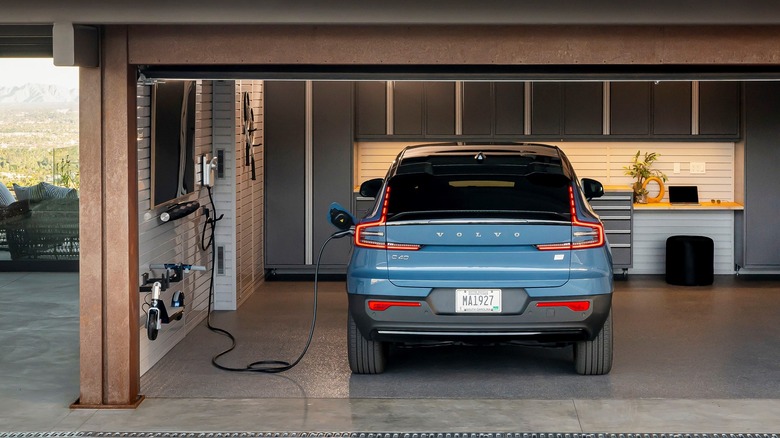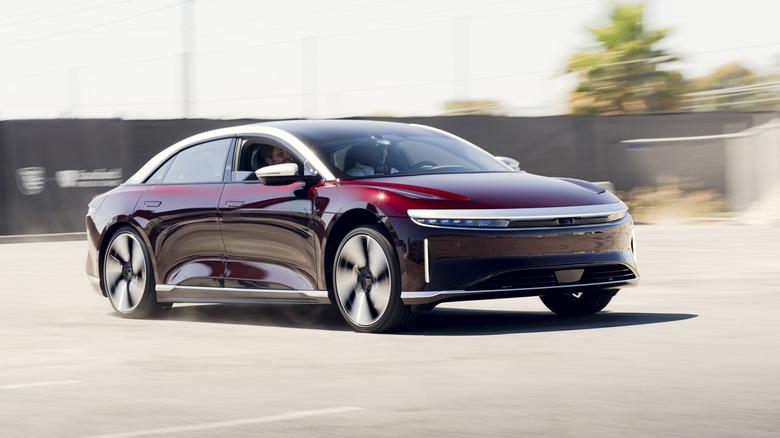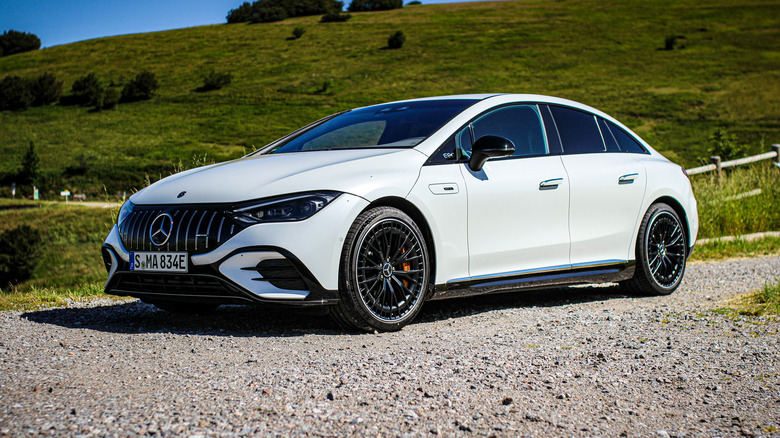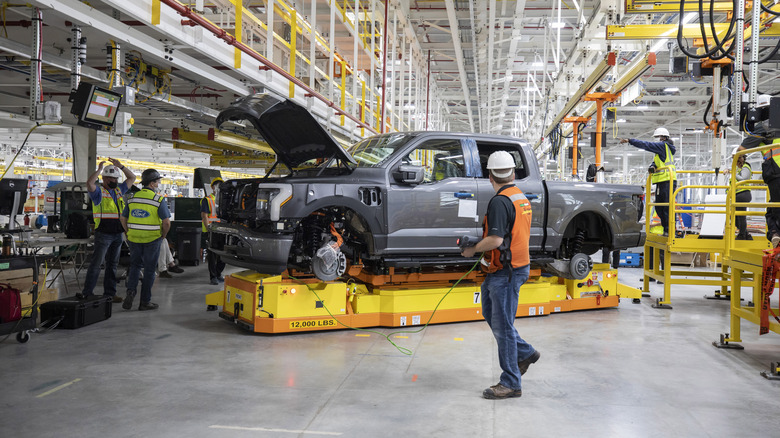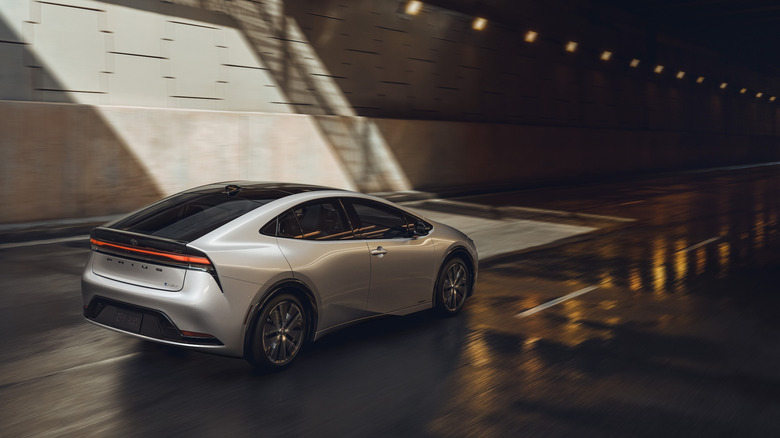5 Reasons We Can't Always Recommend EVs
Fully electric or electrified vehicles are a large — and growing — portion of the automotive mainstream. Overseas, tightening emission regulations are dictating the direction of their progress, while over here in the U.S., adoption is more encouraged, broadly speaking. Even so, there are many good reasons for switching to an electrified ride, but we have to acknowledge that EV ownership isn't necessarily all sunshine and rainbows.
There are some aspects that are just plain annoying, and there are enough to understandably deter anyone with at least a passing interest in cars, if their interest even goes beyond what they offer as a means of conveyance. A car is just a car to some folks. With this in mind, here are a few things about EV adoption that can put off even the most evangelical electric vehicle adopter.
Infrastructure woes
You'll hear this one more than others: we just don't have the infrastructure in place to support wide EV adoption. While Tesla's network of Superchargers present themselves as a model for what could be, their exclusive compatibility with Tesla vehicles in the U.S. — at least for the moment — works in their favor.
If drivers aren't in a Tesla, they're limited to charging stations offered by companies like Electrify America and Chargepoint. These have growing networks that could eventually solve this issue, but we're not there yet. That's also contingent on their functionality. Drivers might find a Level 2 charger around much easier than a DC fast-charging station, though while that might be okay for a bit of top-off of a hybrid's battery during a shopping session, it's not going to cut it for BEV drivers who'll need to ditch their car for hours just for any return on miles.
Even if a station has a fast charger, there's another hurdle: sometimes they simply don't work. Get on social media and you'll quickly notice how most stories coming out of these stations are mostly negative. Between payment not being straightforward to poorly maintained chargers, the supposedly growing network of stations is still leaving many EV drivers high and dry.
Home charging is not for everyone
"That's okay, I'll charge it at home. I don't drive that much and I don't take many road trips," some might say. That's great! Ideally, this is how most people envision EV life, but the key word here is "ideal". If you're a homeowner, it makes sense to set up a charging station in your home and replenish your car's battery just as you plug in your phone at the end of the day, but this living situation isn't universal.
Not all homes have garages and even driveways are scarce in certain areas. EV drivers who rent their homes might find their landlord unwilling to go through the hassle of having a charging box installed. Those who live in apartment buildings will be lucky to have one charger available to tenants, let alone enough for most of the occupants to go electric.
In short, simply saying "I'll charge it at home" isn't an option for many people looking to jump into an EV, and that alone is reason enough for a lot of people to abandon the notion altogether.
Those who are in a position to do so have their own hurdles to clear. Finding the right box is one thing, but then the installation is another matter. Prices for electricians vary, and the condition of the home itself could raise the hassle and subsequently the labor cost. Many local power companies have rebates available for customers if they buy a specific charger, and having a home set up for solar power further mitigates the cost, but both are long term investments that cost a pretty penny upfront. If you're not ready to deal with this for the long term, it could turn into a nightmare not worth the trouble.
Rebate rigamarole
Buying any car can be a headache, regardless of what powers it. Some automakers try to step away from the traditional dealership model, but even those systems have their faults. Ultimately, what matters most is the bottom line, and many EV shoppers are lured in by incentives that sweeten the prospect: not only are you doing a "good thing," you're getting credit for doing so!
How it should work is that a dealership incorporates the $7,500 maximum credit the US government currently has in place to incentivize the purchase of battery-powered vehicles. As of this year, however, landing the credit depends on a number of new factors.
Battery size, the source of materials and a buyer's own income play into the tax credit eligibility, which isn't removed from the car's cost, it's a credit that needs to be filed, adding an extra step to everyone's favorite annual activity. The short version is, what should be a simple incentive has become more convoluted, just adding to the other frustrations of buying an EV. The IRS even has an FAQ about it available for those who want specifics.
Bricked
Say that all of the above is tolerable for an EV buyer. Congratulations. Now, what happens when it breaks? Part of the appeal of an EV is the simplicity of its architecture and how much of the maintenance a car requires is virtually eliminated, but this also poses a problem when something goes awry.
The direct drive nature of the motors in play means that there isn't a gearbox and thus they lack a traditional "neutral" setting, meaning that most EVs are locked in place until a flatbed shows up. There's also the question of what exactly went wrong? Was it a hardware failure or did a software update brick your whole car, like a jailbroken iPhone?
Even combustion-powered cars these days are thoroughly intertwined with complex computer controls, so it's feasible that some shoddy code will render these cars inert too, but the traditional mechanics often mean the vehicle in question can at least be pushed off to the side of the road.
What if nothing breaks and your EV just ran out of juice? Sure, that's primarily driver error, but it happens: due to circumstances, you thought you had enough in the battery to get you somewhere but it wasn't the case, and now you're not going anywhere. This is a hassle for the owner of any car EV or otherwise, but gas-powered cars just need a bit of fuel and they're back on their way, at least to the nearest gas station.
It's much harder to bring a charge back to a stranded electric car. Unless it's a car set up for V2X (AKA charging things with your EV, including other cars), it's likely going to be a gas-powered car generating the emergency juice for you on the roadside, which might sting a little. That could take a significant amount of time, too, and then you're relying on the nearest regular charger being both functional and fast. Hope you can find an outlet and free up the next few hours, because you're not going anywhere in a hurry in that situation.
EV afterlife
At some point down the line, all cars become obsolete in some way. Newer cars with more sophisticated engineering and improved tech always comes along to improve upon what came before. EVs are no different, but they are in many ways more susceptible to obsolescence by virtue of the technology that they are crafted from. Batteries have a finite operational life and will eventually fail to hold a charge, will need to be replaced and, hopefully, recycled. The computer hardware will eventually be too underpowered to keep up with the software updates, threatening to one day be incompatible with the connectivity solutions of the future.
All of this is to say that more than any car before, EVs will be treated as disposable and temporary as the average household appliance. Vintage combustion cars often live on for decades with the right level of care, becoming collectables at best and at least, a reliable, hard-working investment for the kind of car buyer who isn't interested in re-upping every couple of years. Today's EVs will one day be looked at with the same nostalgic amusement as a flip phone. "Remember these? I can't believe we used to drive around with them! How did we get by on such poor battery life?"
One answer to that uncertainty is leasing EVs rather than buying them: that also makes it easier for drivers to upgrade to the newest model. This can be off-putting to those who prefer to own their things outright, but also for those whose initial interest to an EV was to be more environmentally sound. If EV consumption treats them as disposable as old dishwashers, what's to keep them from being tossed out into the already gargantuan waste problem? The short answer is it'll be up to the automakers to recycle and otherwise properly handle a car's end of life, but from a customer standpoint, that's merely passing the buck and trusting them to do so.
Still a ways to go
While we like EVs and know that they're ultimately a good thing for both people and the planet we live on, it's very necessary and fair to recognize that they're far from being the perfect, unblemished replacement for combustion-powered vehicles. They may reduce our impact on the planet, but like everything mass produced, there's still a price to pay.
Beyond that, there are plenty of legitimate quality-of-life issues that anyone interested in an EV should take into account. Like any car, combustion or not, it comes down to what's the right fit for the individual, and you might quickly come to the conclusion that right now, an EV isn't for you, and that's okay. It's up to those who make them and support their functions to do better.
